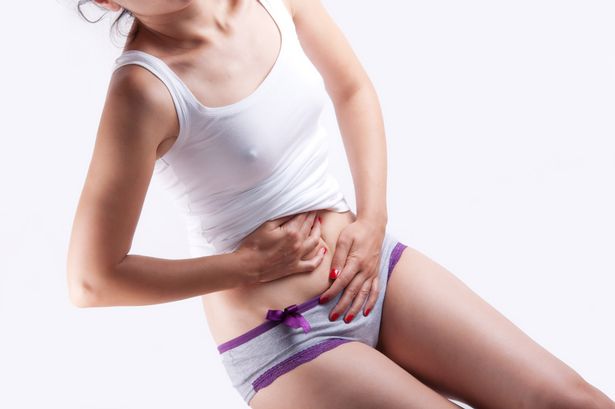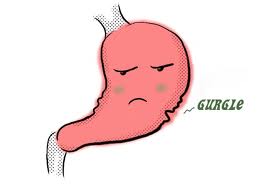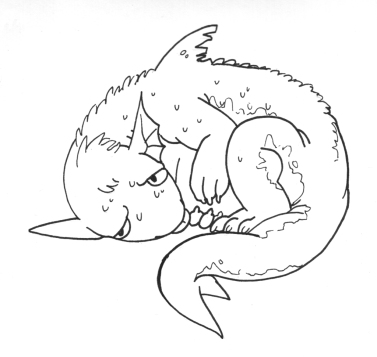
So you’ve started recovery from a restrictive eating disorder, and suddenly you’re experiencing tummy troubles: troubles you may or may not have been expecting. I know that when I started recovery, I was unprepared for the physical symptoms and did not attribute some of them to recovery process. I wish I’d known more: my mum and I were baffled when I started sweating so profusely at night that I was soaking the sheets through, and I thought I had Chronic Fatigue Syndrome at one point when I was unable to even sit up in bed I was so tired. Both of these are normal recovery symptoms (sweating lots indicates your metabolism speeding up, and exhaustion is your body telling you to rest and repair).
The first set of symptoms to normally occur, however, are those related to your digestive system: gas, bloating, constipation, diarrhoea, acid reflux, indigestion, partly digested food, abdominal pain, and having very frequent bowel movements. These symptoms are not fun, and they are certainly not comfortable. However, recovery is about persistence.

Restriction has a huge affect on the body, and with the digestive system, if it the body isn’t processing food regularly and consistently, it will stop wasting energy on working so efficiently. The digestive system slows down: a healthy person’s digestion rate is about 1.5 hours, whereas someone who has been starving themselves can have a digestion rate of 4 or 5 hours. This means that when you start to nourish your body with adequate and consistent energy, the digestive system will need a while to catch up. During the beginning of your recovery, because your digestive system will be working slower, food will sit in the stomach or bowel longer than it should do, which can result in abdominal distension, gas, and constipation. Or the body can go I’VE FORGOTTEN HOW TO PROCESS THAT, which can result in diarrhoea.
Restriction also can result in critical bacteria in the gut being reduced, and digestive enzyme levels being not as they should be, which also contributes towards digestive issues.
Wastage of muscles in the abdominal area can also cause distension as the muscles are not strong enough to hold things in more firmly when food is eaten. Do remember though that your stomach will distend slightly throughout the day naturally – the more food, the more your stomach will distend, and this normal and healthy. Those in recovery though will often find that the bloating and distension is far more extreme than that of a healthy person -and that is normal for the recovery process. Remember that your stomach has most likely shrunken during starvation, and will need to be stretched back to a normal size with refeeding. This is not going to be a great feeling, and it is likely to cause pain and tenderness.
The other thing to talk about is IBS and food sensitivities. During your eating disorder, your body can become unused to processing certain foods, for example, carbohydrates could be one. Dairy products could be another. This could lead you to think that you have a gluten or lactose intolerance if in recovery you start to reintroduce foods like bread, pasta, biscuits, cakes, and pastries, and/or ice cream, cheese, chocolate, and milk back into your diet and you get adverse digestive effects. However, this is generally not the case. If your body has become unused to processing foods that you have restricted for a long time, it is logical that it will now have to work up a tolerance again (like babies have to). It does not mean that you will be permanently intolerant. Abstaining from these foods that you are sensitive to will only mean that the body never gets used to processing it again. Refeeding and reintroducing these foods slowly into your diet – with the help of a doctor if the results are severe – will help your body develop a tolerance to them again and heal the gut. The same is true of IBS. Your doctor may have diagnosed you with IBS if tests for other conditions came back negative. Most of the time, sensitivities and IBS are resolved with refeeding, so give it time. Recovery requires patience and perseverance, so bear with the discomfort and keep on going. If after years, certain symptoms have not resolved themselves, then it is time to look for other causes, but this is fairly uncommon. Obviously if you have diagnosed food allergies or diseases/conditions such as Celiac disease, Crohn’s or ulcerative colitis, neuropathy disease, or have any obstruction in the GI tract, or have any other diagnosed medical condition that would be dangerous and cause damage to you if you were to increase certain foods/types of foods into your diet, then the paragraph above does not apply to you.
So, onto gas. This is probably the most awkward of the recovery symptoms. Smelly gas; loud gas; persistent gas; gas that wakes both you and your partner up with a start when you trump in the night (yes, that happened to me). It can feel embarrassing, but it’s one of the most common symptoms in recovery. If it happens in front of someone (which it probably will) just giggle about it. It may even help to pre-warn them if you are happy to let that person know that you are in recovery from a restrictive eating disorder. It means that they will be expecting it and you can laugh about it (which you can do even if it is a surprise). Everyone farts- you’re just going to be letting off wind a hell of a lot more than the average person for a while.
Frequent bowel movements are also normal. This can be a sign of your digestive system speeding up. I went to the toilet to poop up to seven times in a day for a while (yup, really). If your bowel movements are loose, this could be the I’VE FORGOTTEN HOW TO PROCESS THAT from above.
It is important to continue to eat, even when it is the last thing that you want to do. If you are experiencing a lot of pain, then it is okay to give yourself a break and eat when it feels more tolerable, but discomfort and slight pain is normal and it is important to eat adequately and consistently. However, if you are worried about any symptoms that you are experiencing, please see a doctor to determine if there is anything other than the normal recovery process going on in your body.
So how do you deal with these recovery symptoms?
Firstly, if you are experiencing constipation, eating fats can help move things along. Getting some fibre never goes amiss to prevent it from happening, but this is recovery, so doing healthy people things won’t necessarily work. Warm water is also extremely helpful for constipation – I’d never heard of it before but it has saved me a couple of times. If your stomach is not feeling so great, herbal teas can help settle it, and a hot water bottle can help ease pain or discomfort. For acid reflux and indigestion, there are over the counter medications that you could use, or you can visit your doctor for other options.
I know it sucks, but don’t give up – these symptoms do not last forever. Be patient, and stay on course. Keep moving forwards. As Churchill once said “If you’re going through hell, keep going.” You will come out the other side.


thanks for this post, its exactly what I needed to read at the moment. I find lying down with a hot water bottle, if I can, in a supported rest position like a yoga pose where Im on my back with my hips up helps. Also, reminding myself that it will pass, allowing myself to feel tired, and sleep or read a book or listen to music while it passes helps. best wishes, Em
LikeLike
Pingback: Worthwhile Reads 1/24/16 - Loved and Worthy of Love
Pingback: Link Love | 1.31.16 – Eilish Eats
hey i’ve questions regarding the diarrhoea part! if i’ve kinda been in quasi recovery, meaning that i eat but on a restrictive basis, and only recently started upping my intake by about 1000 cals, and my veg&fruits intake are really high esp during dinners, then does the ‘i’ve forgotten how to digest that’ apply to me?? i’m not sure if my loose bowels are due to the high fibre intake, or due to the restrictive cycle i’ve been in
LikeLike
Yes, the “I’ve forgotten how to process this”is generally applied to anything that you have restricted. So for most people it is fats or carbohydrates (which is why some people can misdiagnose themselves as dairy or gluten intolerant in recovery). It sounds as if your loose bowels could be either of those options – both can set of diarrhoea. It could be a combination of the two. It would be a good idea to get challenging your fruit and veg intake as soon as you can.
LikeLiked by 1 person
I’m 4 months into bulimia recovery without a single b/p cycle, but still I constantly have gas, bloating, constipation, heartburn, fatigue. I eat a well-balanced diet, exercise gently but regularly, and never noticed reactions to specific foods before I began recovery (I used to go days/weeks without purging, so I mean any foods eaten during that time). When does it end? Should I look into IBS and Celiac testing?
LikeLike
Go you for not purging for 4 months – you should be so proud of yourself. Four months in these symptoms are still very much expected. 4 months is relatively a very short time in recovery. Right now you don’t need to look into any testing – these are normal recovery symptoms. You could get some over the counter medication for heartburn. As for constipation, make sure you are getting enough fats in your diet, and for bloating, try peppermint oil capsules or peppermint tea to ease your symptoms a little. Failing that, a hot water bottle helps with the discomfort!
LikeLike
Peppermint capsules and tea should be avoided where there is acid reflux as they make it worse.
LikeLike
How many months did you have digestive problems for?
LikeLike
Hard to say as I had digestive issues for 4 years then found out it was because I was gluten intolerant. But I definitely experienced all the digestive recovery symptoms for about 1-2 months I’d say.
LikeLike
It’s been 3 months for me, I’m so worried it’s never going to get back to normal 😦
LikeLike
That’s not abnormal this early on. If you want to discuss it more though feel free to email me through the contact page which is linked along the pages bar at the top!
LikeLike
that was exactly what i needed. thank you so much for this post!
LikeLike
Hi, I have been in recovery for about 2yrs now, and I am still experiencing the same digestive problems I.e bloating and constipation. is this normal? . Thanks.
LikeLike
Hiya, if you’d like to talk about your recovery process, pop me an email by using my contact section!
LikeLike
I was bulimic for 23 years and will be celebrating 6 months in recovery next week. The first few months went smoothly, then I rapidly gained 12 lbs in about 6-8 weeks as I started eating more at parties, etc (instead of monitoring my portions). Now I have been unable to lose that weight and about one month ago had my first bout ever of constipation (lasting almost 2 weeks) and these last few weeks have had gripping stomach spasms and cramps throughout the day with constant need to go (loose stool that seems to come on small quantities and constant and makes it difficult to go out in public). I’m not sure what’s going on…should I be concerned
LikeLiked by 1 person
If you have questions regarding your recovery please use my contact page to get in touch with me. Thanks!
LikeLike
You’re a very talented writer. You described exactly all of the symptoms i am currently going through. I also didn’t attribute these symptoms to the recovery process until now. The stomach cramps have my head telling me that it’s not possible such pain can be healthy and wanting me to relapse. Just wanted to say thankyou for such a great post and helping me keep pushing through. 🙂
LikeLiked by 1 person
I’m so glad that this has helped.
LikeLike
This is really helpful to read. I’m in the process of refeeding and am struggling with excessive and very smelly gas, stomach cramps and needing to poo a LOT – pretty much after every time I eat or drink anything. I do drink a lot of Pepsi Max – and I have heard that diet fizzy drinks like that make it worse too. A lot of the food on my meal plan is protein and dairy too to avoid refeeding syndrome, so I hoping that as we add in more variety that the digestive issues will calm down.
LikeLike
Thank you so much! This is so reassuring as I’ve been having these symptoms, exactly as you’ve not described! I’m so glad I’m not the only one who experiences this as I was starting to get worried and embarrassed about it! having previously avoided eating a proper lunch for so long, a meal in the middle of the day was giving me grief and I’ve found that having two smaller lunches about 3 hours apart and 3 hours before dinner actually reduces these symptoms too as the body is dealing with a smaller quantity of food at a time if this helps anyone else out!
LikeLike
I’ve been on and off with an eating disorder over the past few years, and thus have been struggling with a lot of what you mentioned all the while. It really does suck, and it’s hard to think that life is ever going to be “normal.” However… I’m trying to keep a positive outlook and keep aiming for good health. It’s so difficult sometimes though. I feel like my body gets angry at me anytime I feed it something. I suppose that just must be it’s way of saying “this is what you get for being so mean to me!!!” Goodness… when does it end!?! 😮
Thanks for the lovely article, dear! ♥
LikeLike
Thank you for this.
I started recovery 18 months ago is it possible my system is still so screwed up I’m getting diahorrea from eating “normal” foods like sandwiches and hot chips that I wouldn’t usually have? (Yup still restricting. Sigh)
LikeLike
Yes because you are still restricting.
LikeLike
Reblogged this on Piece By Piece.
LikeLike
Thanks for the post. I’m just starting the recovery process (again) at the behest of my husband after more than half my life spent with either anorexia or bulimia (about 14-15 years). This is the first time I’ve had to gain weight after restricting so long that my stomach shrank though, so some of the symptoms are new to me – especially the extreme and protracted discomfort. So so so difficult. Anyway, thank you again. -K
LikeLike
Eat five times a day, smaller amounts instead of three and was especially careful of the amount in the evening meal. I see this as my body recovering and rejoice in my poor abused fighting back body rather than resent it. Also found high quality probiotics and fermented/good bacteria creating (prebiotics) , foods important. I take long dog walks with my gorgeous dog and practice mindfulness . Mindfulness is something that helped me stop smoking as well and find contentment, My therapist helped me work out what got me there,how to undertand the tirggers in my lfie and actively absorb and find nourishment for the soul in other things.
LikeLiked by 1 person
I really needed to read this. Thank you so much
LikeLike
I’m so glad it helped!
LikeLike
Today after 2 years, I have finally ate healthy and normal. Breakfast, snacks, lunch, and dinner. I would skip all these with only with snacks and rarely dinner. I never realized how badly I treated my body until the symptoms came. Insane pain and frequent bathroom usage. I’m so glad this blog exists because I got so scared. Thank you.
LikeLike
I’m so glad to hear that. Keep going along that path of eating all meals and snacks – you deserve it.
LikeLike